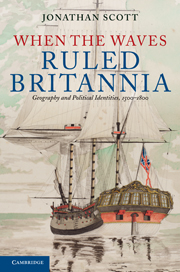Book contents
- Frontmatter
- Contents
- List of figures
- List of maps
- Preface: Geography and the sea
- List of abbreviations
- Introduction: Britain's island idea
- 1 Community of water
- 2 Queen of Sparta
- 3 The discipline of the sea
- 4 Ark of war
- 5 Blowing a dead coal
- 6 The British empire in Europe
- 7 The world in an island
- 8 Anti-continentalism
- 9 What continent?
- Conclusion: floating islands
- Appendix: Duck Language (1724)
- Bibliography
- Index
Appendix: Duck Language (1724)
Published online by Cambridge University Press: 05 June 2012
- Frontmatter
- Contents
- List of figures
- List of maps
- Preface: Geography and the sea
- List of abbreviations
- Introduction: Britain's island idea
- 1 Community of water
- 2 Queen of Sparta
- 3 The discipline of the sea
- 4 Ark of war
- 5 Blowing a dead coal
- 6 The British empire in Europe
- 7 The world in an island
- 8 Anti-continentalism
- 9 What continent?
- Conclusion: floating islands
- Appendix: Duck Language (1724)
- Bibliography
- Index
Summary
[In] these Fens of Lincolnshire … are … an infinite Number of wild Fowl, such as Duck and Mallard, Teal and Widgeon, Brand Geese, wild Geese … and for the taking of the four first Kinds, here are a great Number of Decoys or Duckoys … from all which the vast Number of Fowls they take are sent to London; the Quantity indeed is incredible … [so] that some of these Decoys … are let for great Sums of Money by the Year, Viz. from 100 l. to 3, 4, and 500 l. a Year Rent.
The Art of Taking the Fowls, and especially of Breeding up a Set of Creatures, called Decoy Ducks, to entice and then betray their Fellow-Ducks … is very admirable … and deserves a Description …
The Decoy Ducks are first naturalized to the Place, for they are hatch'd and bred up in the Decoy Ponds … where they are constantly fed, and where being made tame, they are used to come even to the Decoy Man's Hand for their Food.
When they … are sent abroad, they go none knows where; but tis believ'd by some they fly quite over the Seas into Holland and Germany; There they meet with others of … their own Kind, where sorting with them, and observing how poorly they live, how all the Rivers are frozen up, and the Lands cover'd with Snow, and that they are almost starv'd, they fail not to let them know, (in Language that they make one another understand) that in England, from whence they came, the Case is quite alter'd; that the English Ducks live much better than they do in these cold Climates; that they have open Lakes, and Sea Shores full of Food, the Tides flowing freely into every Creek; that they have also within the Land, large Lakes, refreshing Springs of Water, open Ponds, covered and secured from human Eyes, with large Rows of grown Trees and impenetrable Groves; that the Lands are full of Food; the stubbles yielding constant Supplies of Corn, left by the negligent Husbandmen … that 'tis not once in a wild Duck's Age, that they have any long Frosts or deep Snows, and that when they have, yet the Sea is never frozen, or the Shores void of Food; and that if they will please but to go with them into England, that they shall share with them in all these good Things.
- Type
- Chapter
- Information
- When the Waves Ruled BritanniaGeography and Political Identities, 1500–1800, pp. 198 - 199Publisher: Cambridge University PressPrint publication year: 2011



